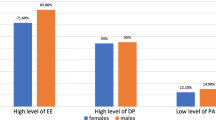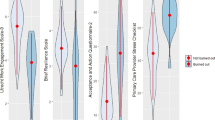Abstract
Background
The transition from medical school to internship can be daunting for newly qualified doctors. High rates of stress and burnout have been reported, with negative impacts on patient care and physician wellbeing.
Aims
We surveyed interns in our hospital group to evaluate rates of stress and burnout, as well as identify the causative factors and propose potential solutions to these.
Methods
A hundred and one interns working in four different hospitals over a 2-year period were invited to participate in an anonymous survey. The survey collected basic demographic details and surveyed aspects of mental health using the burnout scale, Maslach Burnout Inventory (MBI) and the stress scale and 12-item General Health Questionnaire (GHQ-12). Interns were also asked to rate a variety of workplace factors on a Likert scale based on the degree of stress caused. Finally, they were surveyed on their awareness of support services available to them.
Results
Our results showed that 37% of interns met the criteria for psychological distress, high levels of emotional exhaustion, high depersonalisation and a low sense of personal accomplishment were reported in 55.4, 51.5 and 41.6%, respectively. Inadequate preparation for practice, financial worries, poor role definition and sleep deprivation were reported as significant stressors. Most were unaware of available support services and expressed interest in leaving Ireland after internship.
Conclusions
Burnout and stress are significant problems amongst doctors in Irish hospitals. Ensuring better preparation for clinical practice and awareness of support services is vital to tackle this issue.


Similar content being viewed by others
References
Hannon FB (2000) A national medical education needs’ assessment of interns and the development of an intern education and training programme. Med Educ 34(4):275–284
Shanafelt T, Bradley K, Wipf J et al (2002) Burnout and self-reported patient care in an internal medicine residency program. Ann Intern Med 136:358–367
Hayes B, Fitzgerald D, Doherty S et al (2015) Quality care, public perception and quick-fix service management: a Delphi study on stressors of hospital doctors in Ireland. BMJ Open 5(12):e009564
Freudenberger HJ (1974) Staff burnout. J Soc Issues 30(1):159–165
Meier DE, Back AL, Morrison RS (2001) The inner life of physicians and care of the seriously ill. JAMA 286:3007–3014
West CP, Tan AD, Shanafelt TD (2012) Association of resident fatigue and distress with occupational blood and body fluid exposures and motor vehicle incidents. Mayo Clin Proc 87:1138–1144
Shanafelt TD, Balch CM, Bechamps G et al (2010) Burnout and medical errors among American surgeons. Ann Surg 251(6):995–1000
Halbesleben JR, Rathert C (2008) Linking physician burnout and patient outcomes: exploring the dyadic relationship between physicians and patients. Health Care Manag Rev 33(1):29–39
Hayes B, Walsh G, Prihodova L (2017) National Study of Wellbeing of Hospital Doctors in Ireland (internet). Royal College of Physicians in Ireland (accessed 10th September 2017). Available at: https://rcpi-live-cdn.s3.amazonaws.com/wp-content/uploads/2017/05/Wellbeing-Report-web.pdf
Karasek RA (1979) Job demands, job decision latitude and mental strain: implications for job redesign. Adm Sci Q 24:285–307
Iacovides A, Fountoulakis KN, Kaprinis S et al (2003) The relationship between job stress, burnout and clinical depression. J Affect Disord 75(3):209–221
Ben Itzhak S, Dvash J, Maor M et al (2015) Sense of meaning as a predictor of burnout in emergency physicians in Israel: a national survey. Clin Exp Emerg Med 2(4):217–225
Hochberg MS, Berman RS, Kalet AL et al (2013) The stress of residency: recognizing the signs of depression and suicide in you and your fellow residents. Am J Surg 205(2):141–146
Maslach C, Jackson S, Leiter M (1996) Maslach Burnout Inventory manual. Consulting Psychologists Press, Inc., Palo Alto
Rafferty JP, Lemkau JP, Purdy RR et al (1986) Validity of the Maslach Burnout Inventory for family practice physicians. J Clin Psychol 42(3):488–492
Hardy GE, Shapiro DA, Haynes CE et al (1999) Validation of the General Health Questionnaire-12: using a sample of employees from England's health care services. Psychol Assess 11(2):159–165
Hahn D, Reuter K, Harter M (2006) Screening for affective and anxiety disorders in medical patients—comparison of HADS, GHQ-12 and Brief-PHQ. Psychosoc Med 3:Doc09
McManus IC, Winder BC, Gordon D (2002) The causal links between stress and burnout in a longitudinal study of UK doctors. Lancet 359:2089–2090
Holt J, Del Mar C (2006) Reducing occupational psychological distress: a randomized controlled trial of a mailed intervention. Health Educ Res 21(4):501–507
Rosen IM, Gimotty PA, Shea JA et al (2006) Evolution of sleep quantity, sleep deprivation, mood disturbances, empathy and burnout among interns. Acad Med 81(1):82–85
Rosenstein AH (2013) Addressing physician burnout, stress and compassion fatigue: the time has come. Isr J Health Policy Res 2:32
Quill TE, Williamson PR (1990) Healthy approaches to physician stress. Arch Intern Med 150(9):1857–1851
Sood A, Prasad K, Schroeder D et al (2011) Stress management and resiliency training among department of medicine faculty: a pilot randomized clinical trial. JGIM 26(8):858–861
Ramanan RA, Taylor WC, Davis RB et al (2006) Mentoring matters: mentoring and career preparation in internal medicine residency training. J Gen Intern Med 21(4):340–345
Vuori I (1998) Does physical activity enhance health? Patient Educ Couns 33(1):95–103
Robb WB, Falk GA, Khan WH et al (2009) Preparing students to be doctors: introduction of a sub-internship program. Ir Med J 102(10):323–326
Postgraduate Medical Council of Victoria Inc. (2016) Guidelines on best practise protected teaching time for junior doctors (internet). PMCV (accessed 1st June 2017). Available at: http://www.pmcv.com.au/computer-matching-service/resources/208-guidelines-protected-teaching/file
Health Service Executive (2008) Study leave, terms and conditions of employment (internet). HSE (accessed 1st June 2017). Available at: http://www.hse.ie/eng/staff/Resources/hrppg/Terms_and_Conditions_of_Employment_May_2009_pdf
Irish Medical Council (2012) The National Intern Training Programme Curriculum (internet). National Intern Training Programme (accessed 10th September 2017). Available at: https://www.tcd.ie/medicine/ug-med/internship/doc/NITP-June-2012.pdf
Health Service Executive (2016) Transfer of tasks from non-consultant hospital doctors to nurses/midwives under nursing/medical section of the Haddington Road agreement (internet). HSE (accessed 1st June 2017). Available at: http://www.hse.ie/eng/staff/Resources/HR_Circulars/hrcirc0032016.pdf
Carey B, O’Carroll-Lolait C, Donlon NE et al (2015) In-hospital paging systems; an effective method of communication between hospital staff in 2015? Ir Med J 108(9):267–270
Shanafelt TD, Boone S, Tan L et al (2012) Burnout and satisfaction with work-life balance among US physicians relative to the general US population. Arch Intern Med 172:1377–1385
Dyrbye LN, West CP, Satele D et al (2014) Burnout among U.S. medical students, residents, and early career physicians relative to the general U.S. population. Acad Med 89:443–451
O’Connor P, Byrne D, Kerin M et al (2012) An assessment of stress in Irish interns. Med Teach 34(5):424
Hankins M (2008) The reliability of the twelve-item general health questionnaire (GHQ-12) under realistic assumptions. BMC Public Health 8:355
Acknowledgements
The authors would like to thank all of the doctors who participated in the survey.
Author information
Authors and Affiliations
Corresponding author
Ethics declarations
Ethical approval was granted by the local research ethics committees in the affiliated hospitals.
Conflicts of interest
The authors declare that they have no conflicts of interest.
Rights and permissions
About this article
Cite this article
Hannan, E., Breslin, N., Doherty, E. et al. Burnout and stress amongst interns in Irish hospitals: contributing factors and potential solutions. Ir J Med Sci 187, 301–307 (2018). https://doi.org/10.1007/s11845-017-1688-7
Received:
Accepted:
Published:
Issue Date:
DOI: https://doi.org/10.1007/s11845-017-1688-7




